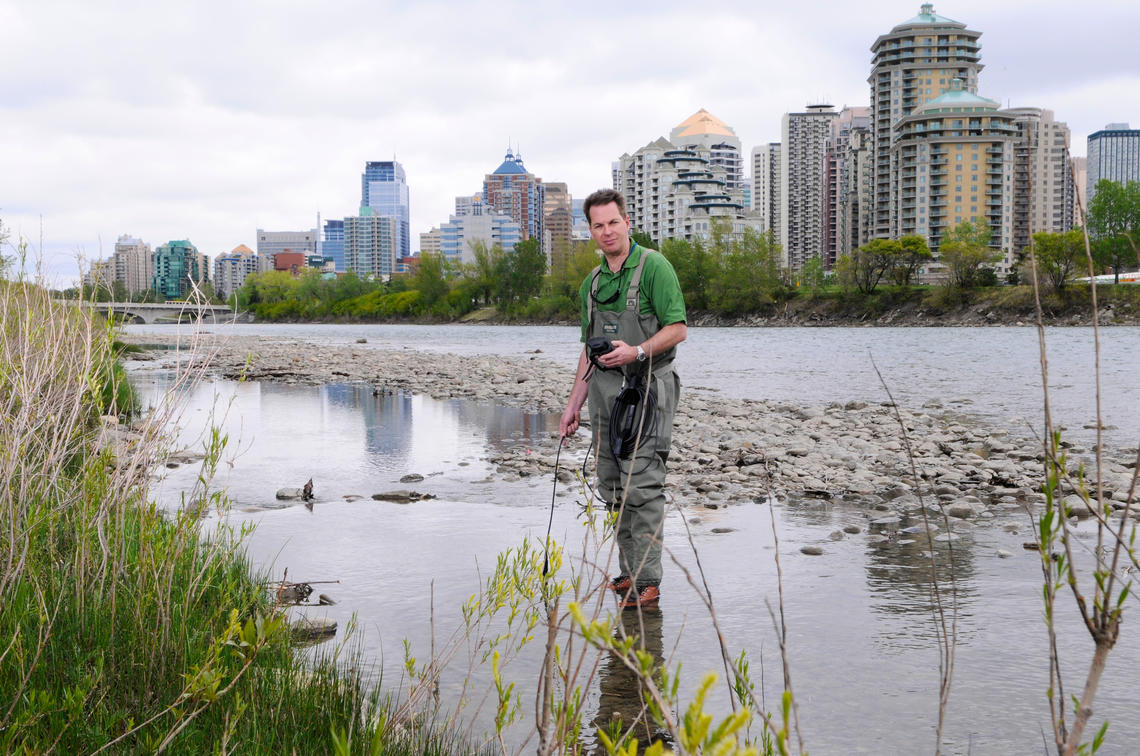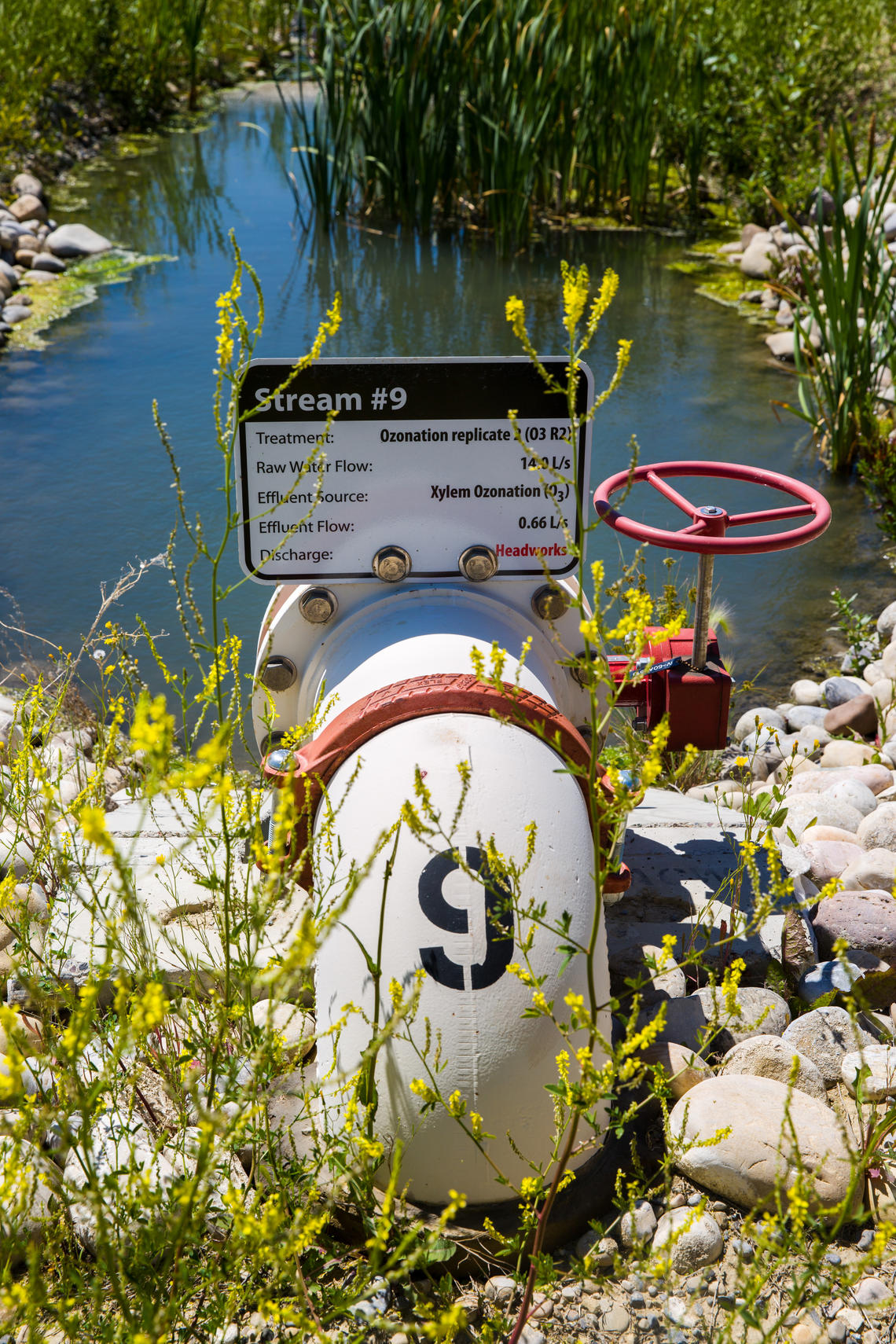
Lee Jackson studies water supplies for both small, rural communities and larger centres.
Riley Brandt, University Relations
March 22, 2019

Today is World Water Day. The United Nations designates a day every year to focus the world’s attention on water as an element of human rights. This year’s theme is Leaving No One Behind.
In Canada, we are fortunate to have an ample supply of water; in fact, some statistics suggest we hold within our borders 20% of the world’s freshwater. And while our issues are not the same as those who struggle to find the resource. We are still challenged to ensure that everyone has access to a sustainable and safe water supply.
In Alberta, we rely on the rivers that run through our province to supply us with water for drinking, irrigation and to sustain our wildlife and fisheries. That resource needs to be clean, safe and sustainable for the entire ecosystem.
At the University of Calgary, experts are working toward this goal. Whether working to mitigate flooding, researching antimicrobial resistant bacteris in wastewater, focusing on the ecosystem around us to provide healthy food sources, or ensuring that all communities have access to clean water, UCalgary experts come from a range of disciplines and come at the topic from a variety of perspectives.

Lee Jackson studies water supplies for both small, rural communities and larger centres.
Riley Brandt, University Relations
Water supply for small, remote communities
Small Alberta communities, like many small communities across Canada, often lack clean drinking water and proper wastewater treatment. Many of these communities are isolated and do not enjoy the infrastructure networks, and access to technology and training to operate technology that deliver clean water people in large municipalities take for granted.
Some of the challenges these small, remote communities face also include variable source water quality and rudimentary wastewater treatment. One consequence of this is that the federal government spends millions transporting bottled water to remote communities, which does nothing to address the root problem and produces plastic waste.
Faculty of Science researchers have partnered with colleagues across Canada to develop a network to tackle some of these water problems. And they’ve come up with some solutions.
“We have designed a drinking water and wastewater treatment system that is scaled to a community of 750 to 1,000 people,” says Dr. Lee Jackson, PhD, professor in the Faculty of Science. “It’s an on-the-ground solution to the water issues of remote communities, with value added components: biofuel production, a greenhouse, and the production of phosphorus-rich fertilizer, which can be used by the community or sold.
“The system includes anaerobic digestion of human and kitchen waste, which produces methane that can be used to run a building. Excess electricity from the system can be used to light and heat a greenhouse, allowing the community to grow food locally. They can also produce struvite, a mineral that is rich in phosphorus and that can be used as fertilizer, which can be used by the community, or sold for profit.
“This technology exists and is being used in the Netherlands — the issue is that we need to find a way to get this into communities. The cost is approximately $1.5 million per community. This work is at a concept stage, and we’re trying to find communities that are willing to partner with us.”

Researcher Susana Kimura-Hara.
Riley Brandt, University Relations
Ensuring a safe drinking water supply
Access to safe drinking water is essential to human life. Researchers have the capacity to significantly advance science to help deliver safe drinking water under a constantly changing environment such as floods and wastewater spills to rivers and lakes.
Dr. Susana Kimura-Hara, PhD, assistant professor in the Faculty of Science, has an interest in keeping our drinking water safe. She is doing that by researching how compounds derived from human activities (i.e., industrial and municipal wastewaters) may be removed or transformed by water treatment processes. Kimura-Hara has just been awared a Canada Foundation for Innovation John R. Evans Leaders Fund (JELF) for her research in this area.
Antimicrobial resistance and wastewater
The emergence and spread of antimicrobial resistance continues unabated around the world, leading to negative health and economic outcomes. This issue has the potential to multiply if collaborative global action isn’t taken to address the spread of resistance.
Major drivers of this resistance include inappropriate prescribing in health care; use of antibiotics in livestock; and the environment serving as a reservoir of antibiotic resistance genes.
At the Advancing Canadian Wastewater Assets (ACWA) research facility, UCalgary researchers are asking how wastewater treatment is helping to limit the spread of antimicrobial resistant bacteria.
“We’re trying to determine if common wastewater treatment disinfection approaches are actually creating an environment where antimicrobial resistance can develop — can we alter or improve current treatment to be the most effective disinfection regime possible?” says Lee Jackson, who also serves as the scientific director of ACWA.
“Some data suggest that in some cases, antimicrobial-resistant bacteria are not actually being killed with some disinfection processes but rather are just going dormant.
“At ACWA,” explains Jackson, “we can evaluate a number of wastewater treatment technologies, and find out if the regulatory specified doses and contact times for disinfection kill these bacteria, temporarily inactivate them or actually select for them."

At ACWA, UCalgary researchers test water quality at various stage of the treatment process.
Riley Brandt, University Relations
Metabolic movement
The award-winning Metabolic Movements is a design strategy with a holistic approach to transportation and urban planning, riparian recovery and stormwater management. The strategy recommends redirecting the Confederation Creek, which would realize an opportunity to reimagine the public space that was once the creek and the surrounding area. This would support the realization of ecological infrastructure and create a nature-inspired multi-modal cultural landscape.
Says Dr. Tawab Hlimi, PhD, assistant professor, Faculty of Environmental Design (EVDS), “Metabolic Movements visualizes a synergy between two parallel movements of infrastructure in Calgary's Confederation Creek watershed. One is the movement to slow traffic flow through what are known as complete streets (streets that accommodate all types of movement, from cars to bikes to pedestrians), optimized for pedestrian and bicyclist safety; and the second, the movement to daylight creeks in order to slow the flow of stormwater and enable biological purification.
“Linked through the common flows of people and water, road and riparian corridors are visualized as a hybrid metabolic network, integrating geographic notions of ‘place’ with the infrastructural imperative of performance.“
Agriculture and its effect on groundwater
Dr. Cathy Ryan, PhD, focuses her research on the agricultural impacts on groundwater; the impacts on groundwater from unconventional gas development and other oil- and gas-related activities; measuring and monitoring dissolved gases in groundwater; wastewater-impacted water; and understanding geyser behaviour.
Ryan, professor in the Department of Geoscience and the associate dean, research and graduate education, Faculty of Science, says, “Unconventional oil and gas development has experienced rapid growth in recent years, which has not been matched by scientific research on impacts to groundwater. Through various avenues, my research addresses fundamental knowledge gaps regarding stray gas and other impacts from unconventional oil and gas development.”
Want to learn more about UCalgary experts on water? Check out our e-book on Water: The importance of conservation and reuse.

Hlimi explains a daylighted Confederation Creek visualized as ecological stormwater infrastructure.
Tawab Hlimi